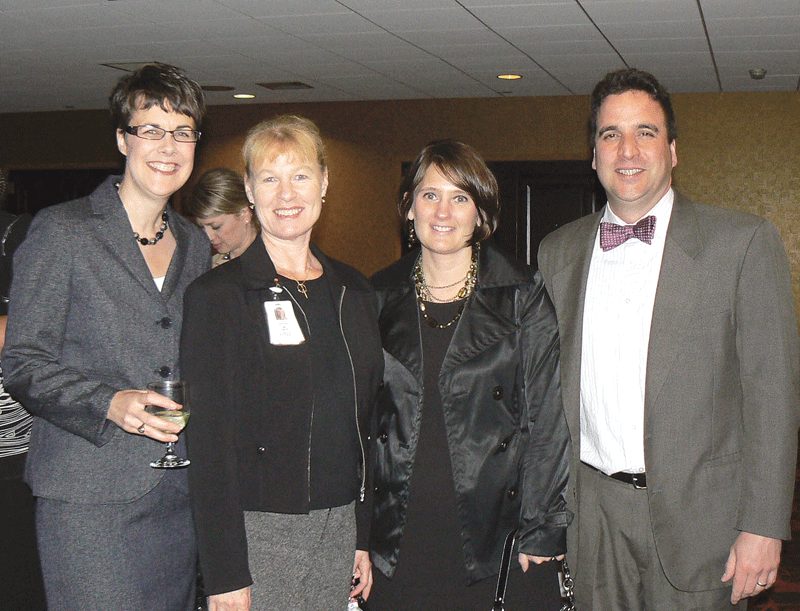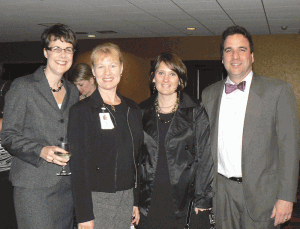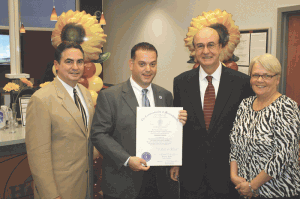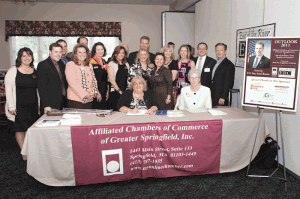The following bankruptcy petitions were recently filed in U.S. Bankruptcy Court. Readers should confirm all information with the court.
Affordable Acupuncture
Rivenson, Alan Paul
5 Highland Dr.
Great Barrington, MA 01230
Chapter: 7
Filing Date: 04/21/11
Aiken, Amy B.
29 Pomeroy St.
Easthampton, MA 01027
Chapter: 7
Filing Date: 04/20/11
Aiken, Randall G.
40A Hadley Village Road
South Hadley, MA 01075
Chapter: 7
Filing Date: 04/20/11
Allard, Deborah A.
89 Brentwood St.
Springfield, MA 01108
Chapter: 7
Filing Date: 04/28/11
Angelica Brothers Electric
724 Main St.
Holyoke, MA 01040-5440
Chapter: 7
Filing Date: 04/26/11
Angell, Stewart J.
Angell, Megan E.
45 Mansfield St.
Springfield, MA 01108
Chapter: 7
Filing Date: 04/25/11
Banks, Michael A.
16 Silver St.
Pittsfield, MA 01201
Chapter: 7
Filing Date: 04/21/11
Beaudry, Eric E.
Beaudry, Amy B.
65 Mountain Road
Holyoke, MA 01040
Chapter: 7
Filing Date: 04/28/11
Bell, Mark B.
5 Hummingbird Dr.
Chicopee, MA 01020
Chapter: 13
Filing Date: 04/30/11
Berthiaume, Joseph
Berthiaume, Carolyn J.
43 Asselin St.
Chicopee, MA 01020
Chapter: 7
Filing Date: 04/30/11
Bistrek, Travis O.
Bistrek, Christy L.
31 High St.
Shelburne Falls, MA 01370
Chapter: 7
Filing Date: 05/02/11
Bullett, Michael L
Bullett, Dawn M.
449 1/2 East Main St.
North Adams, MA 01247
Chapter: 7
Filing Date: 04/29/11
Burns, Leroy R.
Burns, Irene M.
248 Cole Ave.
Williamstown, MA 01267
Chapter: 7
Filing Date: 04/17/11
Butler, Ruth M.
35 West St.
Granby, MA 01033
Chapter: 7
Filing Date: 04/21/11
Campofredano, Donald G.
Campofredano, Dorothy L.
a/k/a Johnson, Dorothy
a/k/a Desrosiers, Dorothy
144 Sikes Ave.
West Springfield, MA 01089
Chapter: 7
Filing Date: 04/29/11
Canales, Samuel
Canales, Belen M.
55 Cass St.
Springfield, MA 01104
Chapter: 7
Filing Date: 04/29/11
Carlson, Brenda
160 Freenam Road
PO Box 781
Charlton, MA 01507
Chapter: 7
Filing Date: 04/27/11
Carpenter, Christine A.
163 Pleasant St.
Easthampton, MA 01027
Chapter: 7
Filing Date: 04/28/11
Cassavant, Eric H.
Cassavant, Charlene L.
a/k/a Jones, Charlene
381 Springside Ave.
Pittsfield, MA 01201
Chapter: 7
Filing Date: 04/16/11
Chan-Ali, Kim
115 Bellevue Ave.
Springfield, MA 01108
Chapter: 7
Filing Date: 04/21/11
Codding, James A.
Codding, Brigitte
950 Allen St.
Springfield, MA 01118
Chapter: 7
Filing Date: 04/28/11
Cook, Thomas B.
18-20 O’Connor Ave.
Holyoke, MA 01040
Chapter: 7
Filing Date: 04/19/11
Costigan, Gary Joseph
65 Maplewood Ave.
Pittsfield, MA 01201
Chapter: 7
Filing Date: 04/29/11
Crosier, John F.
Crosier, Leigh B.
35 East Orchard Ter.
Adams, MA 01220
Chapter: 7
Filing Date: 04/27/11
Damon, Clifford L.
Damon, Sharon M.
260 Ridge Road
Athol, MA 01331
Chapter: 7
Filing Date: 04/25/11
Darrin, Melissa C.
18 Saint Anthony St.
Chicopee, MA 01013
Chapter: 7
Filing Date: 04/29/11
Davis, Linda L.
79 Meadow St., Apt. 2L
Westfield, MA 01085
Chapter: 7
Filing Date: 04/26/11
Davis, Talonda C.
37 Gerald St.
Springfield, MA 01109
Chapter: 13
Filing Date: 04/21/11
DiGrigoli, Peter
25 Cliffwood St.
Lee, MA 01238
Chapter: 7
Filing Date: 04/19/11
Dobbert, Colleen E.
149 Ashton Ave.
North Adams, MA 01247
Chapter: 7
Filing Date: 04/29/11
Drew, Vickie J.
73 Barrett St. #2090
Northampton, MA 01060
Chapter: 7
Filing Date: 04/28/11
Drinkwine, Barry
Drinkwine, Michelle
120 Paramount St.
Springfield, MA 01104
Chapter: 7
Filing Date: 04/29/11
Dryjowicz-Burek, Alan F.
184 Hubbard St.
Ludlow, MA 01056
Chapter: 7
Filing Date: 04/28/11
Ercolino, Linda A.
a/k/a Velthouse, Linda A.
50 Cleveland St.
Palmer, MA 01069
Chapter: 13
Filing Date: 04/27/11
Ferriter, Tara Jean
17 Willow St.
North Adams, MA 01247
Chapter: 7
Filing Date: 04/28/11
Flanders, Theresa M.
11 Francis St.
Greenfield, MA 01301
Chapter: 7
Filing Date: 04/30/11
Gaouette, Leonidas
Gaouette, Carla
103 Bardwell St.
South Hadley, MA 01075
Chapter: 7
Filing Date: 04/29/11
Gassett, Erin L.
a/k/a Piatt, Erin L.
312 Regency Park Dr.
Agawam, MA 01001
Chapter: 7
Filing Date: 04/27/11
Gebo, Heidi Lynne
366 Montague City Road
Turners Falls, MA 01376
Chapter: 7
Filing Date: 04/20/11
Gero, Melissa A.
81 Woodcrest Circle
Chicopee, MA 01020
Chapter: 7
Filing Date: 04/22/11
Giarratano, Anthony C.
4 Rose Court West
Great Barrington, MA 01230
Chapter: 7
Filing Date: 04/29/11
Gore, Brian
414 Chestnut St.
Springfield, MA 01104
Chapter: 7
Filing Date: 04/20/11
Greenhalgh, Patrick Y.
1063 East Mountain Road
Westfield, MA 01085
Chapter: 7
Filing Date: 04/29/11
Guiel Construction, LLC
Guiel, Allen Richard
63 Chesterfield Road
Williamsburg, MA 01096
Chapter: 7
Filing Date: 04/20/11
Gulielmetti, Susan
671 Bay Road, Apt. 1
Belchertown, MA 01007
Chapter: 7
Filing Date: 04/21/11
Hagberg, Stephen S.
111 East St.
Ware, MA 01082
Chapter: 7
Filing Date: 04/21/11
Hansen, Jessica D.
P.O. Box 910
Southwick, MA 01077
Chapter: 7
Filing Date: 04/25/11
Hanson, Jonathan
Hanson, Patti
58 East Longmeadow
Wilbraham, MA 01095
Chapter: 13
Filing Date: 04/26/11
Hayden, Jill R.
117 Lorraine St.
Chicopee, MA 01013
Chapter: 7
Filing Date: 04/28/11
Hayes, John M.
665 East Main St.
Orange, MA 01364
Chapter: 7
Filing Date: 04/30/11
Hervieux, Mary C.
54 Bruni Ave.
Ludlow, MA 01056
Chapter: 7
Filing Date: 04/26/11
Hill, Tamara W.
646 Alden St.
Springfield, MA 01109
Chapter: 7
Filing Date: 04/29/11
Hodgkins, Peter S.
15 Navin Ave.
Lee, MA 01238
Chapter: 7
Filing Date: 04/21/11
Holmgren, John
Holmgren, Joy S.
481 Leadmine Road
Sturbridge, MA 01566
Chapter: 7
Filing Date: 04/27/11
Honea, David H.
48 Greenwich St.
Chicopee, MA 01013
Chapter: 7
Filing Date: 04/18/11
Hopkins, Theresa L.
227 Robbins Ave.
Pittsfield, MA 01201
Chapter: 7
Filing Date: 04/27/11
Hudson, Joseph Lawrence
386 Hermitage Dr.
Springfield, MA 01129
Chapter: 13
Filing Date: 04/29/11
Jackson, Gloria J.
32 Hampton Ave.
Northampton, MA 01060
Chapter: 7
Filing Date: 04/25/11
Jacob, William Shawn
14 Cedar Lake Dr.
Sturbridge, MA 01566
Chapter: 7
Filing Date: 04/29/11
Jerusik, Lori A.
17 Jeanette Dr.
Chicopee, MA 01013
Chapter: 7
Filing Date: 04/28/11
Jette, Susanne C.
PO Box 325
Palmer, MA 01069
Chapter: 7
Filing Date: 04/18/11
JKM Custom Builders, LLC
McComb, Joshua Kane
McComb, Breanne M
a/k/a Hawkins, Breanne M.
1 George Ave.
Turners Falls, MA 01376
Chapter: 7
Filing Date: 04/28/11
Johnson, Edward C.
7 Stebbins Road
Monson, MA 01057
Chapter: 7
Filing Date: 04/18/11
Julian, Jacqueline C.
58 Emmett St.
Chicopee, MA 01020
Chapter: 7
Filing Date: 04/19/11
Jurik, Michael Anthony
PO Box 475
Shelburne Falls, MA 01370
Chapter: 7
Filing Date: 04/28/11
Kaleta, James W.
Kaleta, Melissa A.
11 Cherry St.
Westfield, MA 01085
Chapter: 7
Filing Date: 04/28/11
Kneeskern, James K.
Kneeskern, Muriel A.
94 Senator St.
Springfield, MA 01129
Chapter: 7
Filing Date: 04/19/11
Knight, Deborah L.
950 Blandford Road
Russell, MA 01071
Chapter: 7
Filing Date: 04/30/11
Knight, Deborah L.
950 Blandford Road
Russell, MA 01071
Chapter: 7
Filing Date: 04/30/11
Lastowski, Richard A.
Lastowski, Kathleen J.
218 Montague City Road
Turners Falls, MA 01376
Chapter: 7
Filing Date: 04/28/11
Lavalle, Frank Robert
538 Springfield St.
Feeding Hills, MA 01030
Chapter: 7
Filing Date: 04/27/11
Lavalley, Wesley W.
Lavalley, Sharon L.
56 Glendale St.
Easthampton, MA 01027
Chapter: 7
Filing Date: 04/30/11
Leavitt, Amanda
72 Paige St.
Athol, MA 01331
Chapter: 13
Filing Date: 04/30/11
Lemarier, Nicole M.
57 Water St.
Granville, MA 01034
Chapter: 7
Filing Date: 04/29/11
Lewis, Adam J.
25 Congress St.
Athol, MA 01331
Chapter: 7
Filing Date: 04/25/11
Lowe, R. Dennis
a/k/a Lowe, Richard D.
83-B Blunt Road
Great Barrington, MA 01230
Chapter: 7
Filing Date: 04/21/11
Lund, Carol
82 Hewitt St.
West Springfield, MA 01089
Chapter: 7
Filing Date: 04/29/11
Lyon, Gregory J.
P.O. Box 482
Granby, MA 01033
Chapter: 12
Filing Date: 04/27/11
Magical Beadstalk
Spier-Kalmar, Terry Ellen
47 Brookline Ave.
Holyoke, MA 01040
Chapter: 7
Filing Date: 04/29/11
Mantzios, John M.
116 Tolpa Circle
Chicopee, MA 01020
Chapter: 13
Filing Date: 04/29/11
Matthews, Roland A.
Matthews, Tammy S.
338 Vine St.
Athol, MA 01331
Chapter: 7
Filing Date: 04/30/11
McBain Home Remodeling
McBain, Wesley H.
a/k/a Parsley, Wesley H.
McBain, Danielle M.
91 Springfield St.
Three Rivers, MA 01080
Chapter: 7
Filing Date: 04/20/11
McCarthy, Joanne Ellen
102 Popular Ave.
West Springfield, MA 01089
Chapter: 7
Filing Date: 04/29/11
McClenathan, John R.
a/k/a Tinker, John
13 East Howe St., No. 3
Orange, MA 01364
Chapter: 7
Filing Date: 04/23/11
McGeoghan, Joann Mary
75 Christopher Lane
Feeding Hills, MA 01030
Chapter: 7
Filing Date: 04/28/11
Medina, Jose
44 Ashley St.
Springfield, MA 01105
Chapter: 7
Filing Date: 04/19/11
Michalak, Anthony
Michalak, Carolyn
6 Varney St.
Springfield, MA 01108
Chapter: 13
Filing Date: 04/29/11
Miller, Thomas F.
Miller, Cheryl A.
103 West Crystal Brook Dr.
Springfield, MA 01118
Chapter: 7
Filing Date: 04/21/11
Minor, Bernard S.
Minor, Lorraine M.
29 Pinecrest Dr.
Chicopee, MA 01020
Chapter: 7
Filing Date: 04/29/11
Montemagni, Rachel A.
a/k/a Lepage Montemagni, Rachel A.
141 Saint James Ave.
Chicopee, MA 01020
Chapter: 7
Filing Date: 04/29/11
Morris, Norman E.
Morris, Elizabeth A.
69 South Hampton Road
Amesbury, MA 01913
Chapter: 13
Filing Date: 04/21/11
Morton, Thomas R.
16 Fairgrounds Ave.
North Adams, MA 01247
Chapter: 7
Filing Date: 04/21/11
Moses, Kimberly Ann
28 Birchwood Road
Southwick, MA 01077
Chapter: 7
Filing Date: 04/29/11
Mousseau, William J.
Mousseau, Lori A.
116 South Main St.
Athol, MA 01331
Chapter: 13
Filing Date: 04/22/11
Ortiz, Audrey J.
Ortiz, Luis M.
5 West School St.
Westfield, MA 01085
Chapter: 7
Filing Date: 04/20/11
Parks, Leslie R.
a/k/a L’Kuicha Parks
86 Princeton St.
Springfield, MA 01109
Chapter: 13
Filing Date: 04/29/11
Perez, Elba
188 Wollaston St.
Springfield, MA 01119
Chapter: 7
Filing Date: 04/25/11
Perez, Margarita
a/k/a Kareh, Margarita
300 East Main St.
Chicopee, MA 01020
Chapter: 7
Filing Date: 04/20/11
Petrin, Adelaide Patricia
7 Oak Knoll Dr.
South Deerfield, MA 01373
Chapter: 7
Filing Date: 04/28/11
Poprovo, Mark Joseph
Poprovo, Lynette H.
a/k/a Campbell, Lynette H.
419 Montcalm St., Apt. 47
Chicopee, MA 01020
Chapter: 7
Filing Date: 04/26/11
Prevost, Tammy S.
119 Berkshire Ave.
Southwick, MA 01077
Chapter: 13
Filing Date: 04/22/11
Puustinen, Carla L.
25 Congress St.
Athol, MA 01331
Chapter: 7
Filing Date: 04/25/11
Ramos, Joanny
135 Jackson St.
Holyoke, MA 01040
Chapter: 7
Filing Date: 04/21/11
Remillard, Kara L.
132 Newton St.
South Hadley, MA 01075
Chapter: 7
Filing Date: 04/19/11
Richard, Susan Hannah
a/k/a Race, Susan
464 Chestnut St.
East Longmeadow, MA 01028
Chapter: 7
Filing Date: 04/29/11
Richards, Angela M.
a/k/a Hebert, Angela Marie
P.O.Box 966
East Longmeadow, MA 01028
Chapter: 7
Filing Date: 04/25/11
Rivera, Armando
593 South Bridge St
Holyoke, MA 01040
Chapter: 7
Filing Date: 04/20/11
Romero-Benitez, Marylyn
35 Springdale Ave.
Holyoke, MA 01040
Chapter: 7
Filing Date: 04/25/11
Rosario, Felix
123 Massasoit St.
Springfield, MA 01107
Chapter: 7
Filing Date: 04/26/11
Roy, Jason T.
Roy, Aimee M.
a/k/a Procopio, Aimee
61 Pine Grove Dr.
Pittsfield, MA 01201
Chapter: 13
Filing Date: 04/25/11
Ryan, John W.
Ryan, Rachel L.
a/k/a Machart, Rachel
a/k/a Tworkowski, Rachel
a/k/a Sinclair, Rachel
128 Mechanic St.
Orange, MA 01364
Chapter: 7
Filing Date: 04/30/11
Sanchez, Carmen D.
77 Tokeneke Road
Holyoke, MA 01040
Chapter: 7
Filing Date: 04/27/11
Schieppe, Carrie A.
a/k/a Pierce, Carrie A.
100 Russell Road
Westfield, MA 01085
Chapter: 7
Filing Date: 04/29/11
Sias, Annemarie
a/k/a Spear, Annmarie
155 Woodland Dr.
Hampden, MA 01036
Chapter: 13
Filing Date: 04/21/11
Siefken-Watt, Jennifer L.
a/k/a Kratovil, Jennifer
94 Kensington St.
Feeding Hills, MA 01030
Chapter: 7
Filing Date: 04/28/11
Sikes, Bruce William
4 Hillside Road
Southwick, MA 01077
Chapter: 7
Filing Date: 04/20/11
Soderberg, Brendon M.
Soderberg, Stephanie L.
24 Stafford Road
Wales, MA 01081
Chapter: 13
Filing Date: 04/29/11
Sokhom, Ping
155 Baystate Road
Chicopee, MA 01020
Chapter: 13
Filing Date: 04/17/11
Spaulding, Brian A.
Spaulding, Jillian E.
64 Audubon St.
Springfield, MA 01108
Chapter: 7
Filing Date: 04/21/11
Spooner, Christina L.
a/k/a Prouty, Christina L.
157 Harugari St.
Athol, MA 01331
Chapter: 7
Filing Date: 04/29/11
Springfield Limo Airport & Car
Zamboni, Dino J.
Zamboni, Susan A.
12 Iroquois Lane
Wilbraham, MA 01095
Chapter: 7
Filing Date: 04/25/11
Sterner, Gail A.
37 Smith St.
Palmer, MA 01069
Chapter: 7
Filing Date: 04/29/11
Stetson, Melissa Anne
202 Gifford St.
Springfield, MA 01118
Chapter: 7
Filing Date: 04/27/11
Tabb, Kevin B.
111 Glenoak Dr.
Springfield, MA 01129
Chapter: 13
Filing Date: 05/02/11
Taylor, William A.
Taylor, Joanne C.
86 Morton St.
West Springfield, MA 01089
Chapter: 7
Filing Date: 04/28/11
Thompson, Georgette Annmarie
72 Garfield St.
Springfield, MA 01108
Chapter: 13
Filing Date: 04/21/11
Thorng, Kimsuor
155 Baystate Road
Chicopee, MA 01020
Chapter: 13
Filing Date: 04/17/11
Thorpe, Jason G.
119 Montague City Road
Greenfield, MA 01301
Chapter: 7
Filing Date: 04/28/11
Torres-Montes, Elias
415 East River St.
Orange, MA 01364
Chapter: 7
Filing Date: 04/23/11
Tremblay, Gerard N.
Tremblay, Tara A.
48 Flint St.
Springfield, MA 01129
Chapter: 7
Filing Date: 04/20/11
Wallace, David C.
Wallace, Jane L.
2 Howe Road
Pittsfield, MA 01201
Chapter: 7
Filing Date: 04/21/11
Wellspeak, Ronald D.
549 Russell Road Apt. 13D
Westfield, MA 01085
Chapter: 7
Filing Date: 04/18/11
Whitlock, Sharen Jennice
37 Bacon Road
Springfield, MA 01119
Chapter: 7
Filing Date: 04/29/11
Williams, Alice R.
38 Ahrend Circle
Southwick, MA 01077
Chapter: 7
Filing Date: 04/21/11
Wilson, Princess G.
a/k/a Giarratano, Gail
4 Rose Court West
Great Barrington, MA 01230
Chapter: 7
Filing Date: 04/29/11
Wood, David H.
17 Lincoln St.
Greenfield, MA 01301
Chapter: 7
Filing Date: 04/26/11
Woods, Edwina D.
65 Quebec St.
Indian Orchard, MA 01151
Chapter: 7
Filing Date: 04/19/11
Zapasnik, Stanley P.
Zapasnik, Diane L.
30 Fritscher Road
Barre, MA 01005
Chapter: 7
Filing Date: 04/29/11
Zelaya-Oseguera, Mercedes
415 East River St.
Orange, MA 01364
Chapter: 7
Filing Date: 04/23/11





























